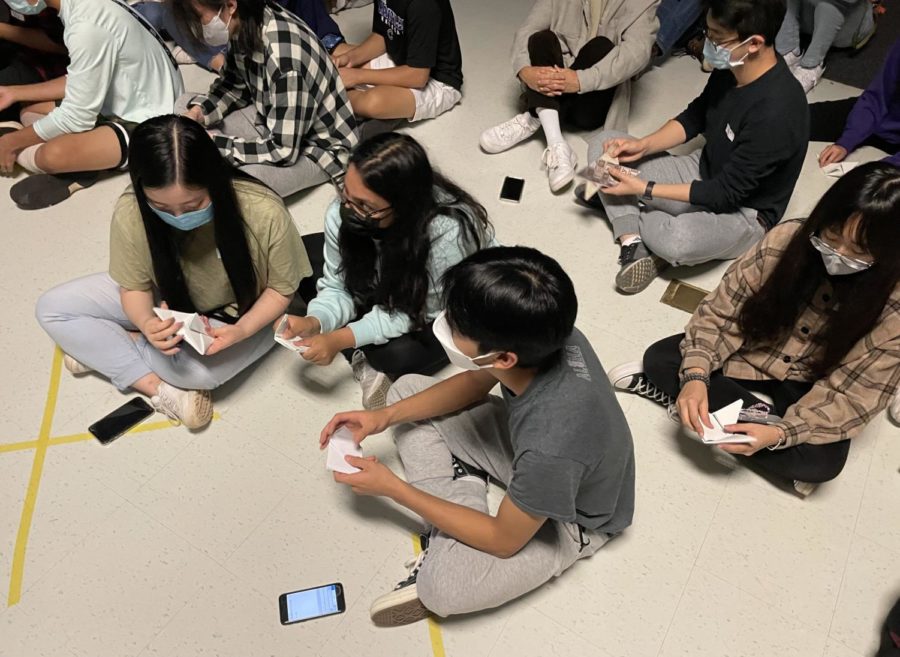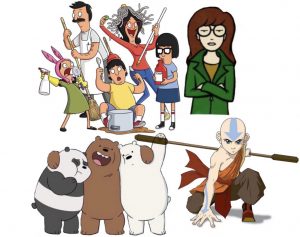‘Squid Game’: Students engrossed in Korean dystopian thriller
At the end of the “Squid Game” competition held by the Asian Student Association (ASA) on Oct. 12, senior and ASA research committee member Erica Lee rewards senior Adrian Kim, one of the winners, with a homemade dalgona in similar design to that in the show.
November 8, 2021
Heated discussions and enthusiastic chatter have erupted amongst students with the release of Netflix’s new, sensational series: “Squid Game.”
In this thriller-drama from South Korea, debt-ridden contestants are given the chance to win an enormous cash prize of ₩45.6 billion if they win six childhood-inspired games. However, if they lose, they are killed. Creeping between the innocence of the games and their violent consequences, “Squid Game” has quickly become Netflix’s biggest series launch with 111 million viewers less than a month after its release. Students have been obsessing over the show for multiple reasons.
“[Other than] the drama, games and thrill of watching, my favorite part of ‘Squid Game’ was its message,” senior Ayham Elayan said. “It has a lot of meaning and truths about human nature [demonstrated through] the people in it.”
According to an interview he did with Variety, director Hwang Dong-hyuk kept the games simple so the audience could focus on what the characters feel as they trust, suspect and betray each other.
“[Characters’] choices are decisions that regular people make but [portrayed through] horrendous scenes,” Korean teacher Eunjoo Lee said. “I think the story is really well made.”
The show has also taken over social media in the form of memes, fan art and plot theories. #SquidGame has over 40 billion views on TikTok, and some actors in the show have gained millions of followers on Instagram. The Dalgona Challenge—one of the games in the show where one must carve out a piece of dalgona candy with a needle—has also been trending online and in school.
On Oct. 12, the Asian Student Association (ASA) held a “Squid Game” meeting in which winners of a three-game tournament won homemade dalgona.
“I spent hours making dalgona the whole week,” ASA research committee member and senior Erica Lee said. “[ASA] chose dalgona as the prize because it has gained a lot of popularity. We thought it’d be a sweet, little prize from which [winners] could learn more about Korean childhood culture.”
Other than the actors, food and games from the show gaining attention, “Squid Game” sheds light on the lesser-known issues in Korea, such as the extreme wealth disparity, expensive housing market and rigorous education system, through the backstories and circumstances of multiple characters. The root of their financial crises reflects the state of the Korean economy in which 90% of the country’s wealth belongs to the top 10% of the population.
Poverty in South Korea has been a long-established problem. The average person needs 300 million won to even consider purchasing a house and expensively-attained college degrees have less worth in the job market due to high levels of competition, according to the Borgen Project.
“‘Squid Game’ really shows the flip side of what Korea actually is [and] the reality of so many people [there],” Erica said. “A lot of times, Korea gets romanticized as if everything and everyone is pretty and perfect.”
Due to its popularity, many feel that “Squid Game” has not only opened the door for more foreign media in America, but has also busted the myth claiming that subtitles were the reason why foreign films weren’t popular in America.
“I think it’s kind of ridiculous to say a film can’t succeed just because it’s in a different language and [from] a different country,” Elayan said. “Foreign films have great potential, and I think ‘Squid Game’ will motivate more people to watch foreign films.”
However, some Korean-speaking viewers have noted many mistranslations in the English subtitles available on Netflix.
Once an interpreter, Eunjoo believes that the purpose of translating is to mediate cultures, and the subtle differences between the actual dialogue and the English subtitles hinders the non-Korean speaker’s viewing experience.
“[Mistranslations] lead to misunderstandings that cut down the flavor and atmosphere of certain scenes,” Eunjoo said. “I [wish I could] try and transfer strong emotions that actors deliver to other actors in scenes since [the current translations] really lessen the effect.”
With so much attention surrounding South Korea in the past few years—from K-Pop bands like BTS and Blackpink to the K-Drama genre as a whole—cultural boundaries between students subside.
“I’ve never been ashamed of my own culture,” Erica said. “But I feel like ‘Squid Game’ gave me a link between myself and people who aren’t Korean to be able to more freely talk about Korean culture.”






